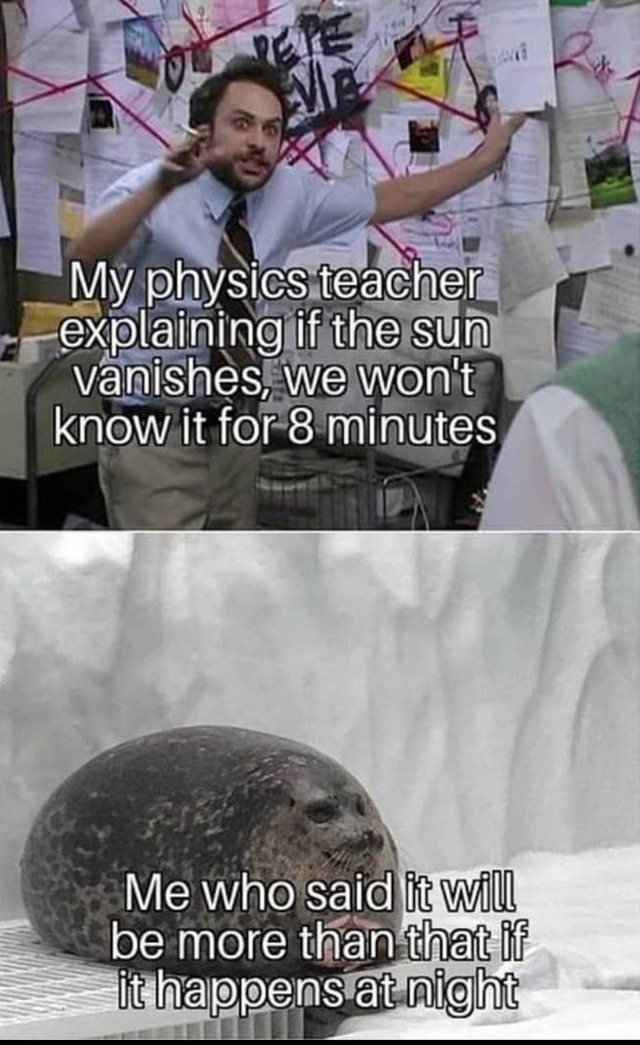this post was submitted on 08 Aug 2024
888 points (98.5% liked)
Science Memes
10271 readers
2803 users here now
Welcome to c/science_memes @ Mander.xyz!
A place for majestic STEMLORD peacocking, as well as memes about the realities of working in a lab.

Rules
- Don't throw mud. Behave like an intellectual and remember the human.
- Keep it rooted (on topic).
- No spam.
- Infographics welcome, get schooled.
Research Committee
Other Mander Communities
Science and Research
Biology and Life Sciences
- !abiogenesis@mander.xyz
- !animal-behavior@mander.xyz
- !anthropology@mander.xyz
- !arachnology@mander.xyz
- !balconygardening@slrpnk.net
- !biodiversity@mander.xyz
- !biology@mander.xyz
- !biophysics@mander.xyz
- !botany@mander.xyz
- !ecology@mander.xyz
- !entomology@mander.xyz
- !fermentation@mander.xyz
- !herpetology@mander.xyz
- !houseplants@mander.xyz
- !medicine@mander.xyz
- !microscopy@mander.xyz
- !mycology@mander.xyz
- !nudibranchs@mander.xyz
- !nutrition@mander.xyz
- !palaeoecology@mander.xyz
- !palaeontology@mander.xyz
- !photosynthesis@mander.xyz
- !plantid@mander.xyz
- !plants@mander.xyz
- !reptiles and amphibians@mander.xyz
Physical Sciences
- !astronomy@mander.xyz
- !chemistry@mander.xyz
- !earthscience@mander.xyz
- !geography@mander.xyz
- !geospatial@mander.xyz
- !nuclear@mander.xyz
- !physics@mander.xyz
- !quantum-computing@mander.xyz
- !spectroscopy@mander.xyz
Humanities and Social Sciences
Practical and Applied Sciences
- !exercise-and sports-science@mander.xyz
- !gardening@mander.xyz
- !self sufficiency@mander.xyz
- !soilscience@slrpnk.net
- !terrariums@mander.xyz
- !timelapse@mander.xyz
Memes
Miscellaneous
founded 2 years ago
MODERATORS
you are viewing a single comment's thread
view the rest of the comments
view the rest of the comments

I'm trying to understand how that reference frame works when you just just bounce a photon off a mirror and time how long it takes to come back? Like, light must have a non-infinite speed to the stationary observer, or it wouldn't take time to traverse the distance.
The observable effect is the same either way. If light is infinitely fast and causality propagates at c then it's still going to take (distance to the mirror / c) for the fact that you turned on the light to reach the mirror, and that same amount of time for the fact that the light reflected to propagate back to you.
Those two things don't square. If you're moving relative to the mirror when your fire the photon, it would hit in a different place than if you were stationary. The photon can't be moving infinitely fast in your reference frame for that to happen.
Would it? What does "stationary" mean when discussing relative velocities? The mirror being stationary and the person firing the photon moving at a constant velocity is literally an indistinguishable scenario from a stationary person firing the photon at a moving mirror.
If I am moving relative to a mirror when I fire the photon, then the mirror is moving relative to me, and will be in a different relative position by the time the "event" of my firing that photon reaches it.
Also, the photon isn't moving infinitely fast in my (the firer's) reference frame. It's moving infinitely fast in it's own reference frame.
Yeah I eventually picked up that that's what you meant in your original comment, not that photons move instantaneously and that causality somehow catches up later.